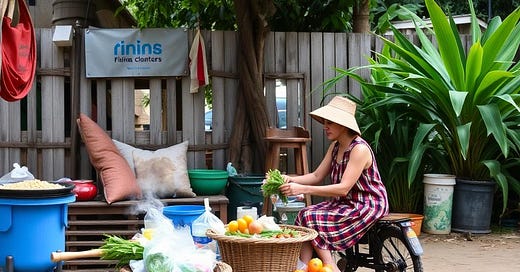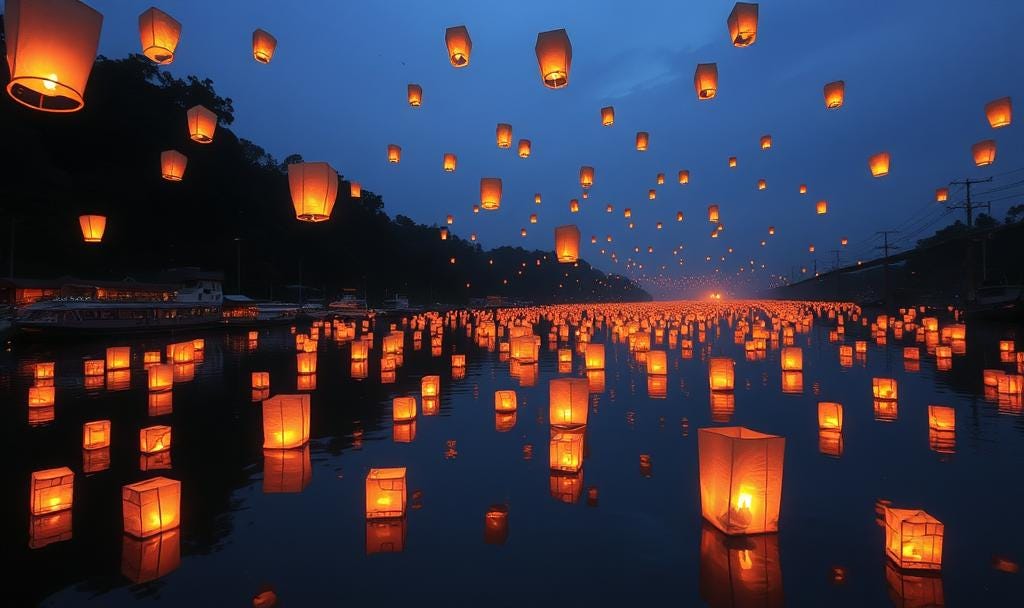When I first arrived in Thailand, I thought I was just another traveler chasing sunshine and street food. But within weeks, the rhythm of life here pulled me in.
Fast forward two years, and I’m still in Chiang Mai, waking to the sound of temple bells, sipping strong Thai coffee from my favorite street stall, and navigating a life that’s both beautifully simple and deeply enriching.
If you're curious about what living in Thailand really looks like—from daily routines and cost of living to navigating logistics and soaking in local culture—let me take you inside my experience.
A Typical Day in Chiang Mai
My mornings usually begin around 7 a.m. with a walk to the neighborhood market. I grab breakfast from a vendor I now call “Auntie Nok”—a warm bowl of jok (Thai rice porridge) with pork and a soft-boiled egg for about 40 baht ($1.10). While I eat at a shared plastic table under a tarp, I chat in broken Thai with locals (I’m still learning the language) and watch the neighborhood come to life.
After breakfast, I return to my apartment, a one-bedroom unit in a modern condo with a pool and gym, where I pay 11,000 baht ($300) per month, including Wi-Fi. It’s a 10-minute motorbike ride to the Old City but tucked into a quiet neighborhood with trees and birdsong—two things I didn’t know I needed until I moved here.
I work remotely as a content writer, so my late mornings and early afternoons are usually spent in a local coworking space or at one of Chiang Mai’s many cozy cafes. A cappuccino costs about 60 baht ($1.60), and lunch—often a spicy papaya salad and grilled chicken with sticky rice—runs about 80 baht ($2.15).
Evenings might mean dinner with friends at a riverside restaurant, a Thai language class, or catching live music at a local expat bar. I typically spend around 25,000–30,000 baht ($700–$850) a month, and that includes rent, utilities, food, transportation, entertainment, and occasional travel.
Festivals and Cultural Magic
What really makes life in Thailand shine are the festivals. They aren't just spectacles for tourists—they’re woven into the heart of the culture.
One of my favorites is Loy Krathong, held every November. Imagine thousands of floating lanterns drifting along rivers while sky lanterns lift into the dark night, carrying away past misfortunes and welcoming new blessings. Locals make beautiful lotus-shaped rafts with candles and flowers, sending them down the water in a collective act of reflection and hope. I’ve joined Thai friends in crafting our krathongs, and we gather at the Ping River each year to let go of what no longer serves us.
Then there’s Songkran, the Thai New Year in April, known worldwide for its giant water fights. But behind the playful chaos is a deep tradition—paying respect to elders, cleaning homes and altars, and starting fresh. It’s a joyful, messy, soul-cleansing time of year, and if you're here during Songkran, prepare to be soaked and smiling for three days straight.
Lessons Learned: Logistical Tips for New Expats
Moving to Thailand wasn’t without its hurdles. But over time, I picked up a few tricks:
Visas require homework. I started on a tourist visa but now hold an education visa while taking Thai classes. Retirement, business, and Smart visas are also common paths. Visa regulations change often, so I check official Thai embassy updates and follow trusted expat groups online for the latest.
Scooters rule the road. If you plan to stay long-term, getting your Thai driver’s license and learning basic road rules (and the unspoken ones) is essential. I bought a secondhand motorbike for 22,000 baht ($600), and monthly gas costs me less than $15.
Health insurance matters. Private hospitals are excellent here—clean, modern, and staffed with English-speaking doctors. I use a regional insurance plan that costs me about $500 annually, and it’s already paid for itself with two visits and one minor outpatient procedure.
Learn the language—slowly but surely. You won’t become fluent overnight, but even a few polite words go a long way. Thai people light up when you try. I take lessons twice a week and practice at markets, taxis, and with my landlord’s chatty grandmother.
Building a Life, Not Just a Vacation
What started as an extended adventure has turned into a life I genuinely love. I've made friends from around the world and from down the street. I’ve traded 9-to-5 stress for slow mornings, fresh mango smoothies, and spontaneous weekend trips to waterfalls or ancient ruins.
Moving abroad isn’t always easy—it takes patience, flexibility, and a willingness to be uncomfortable sometimes. But Thailand offers a beautiful balance: affordable living, rich culture, warm people, and a lifestyle that invites you to live fully, not just fast.
So if you’re standing at the edge of possibility, wondering whether a move to Thailand is the right step—know this: You won’t regret trying. Because sometimes the life you’ve been dreaming of is waiting on the other side of a plane ticket and a little courage.






